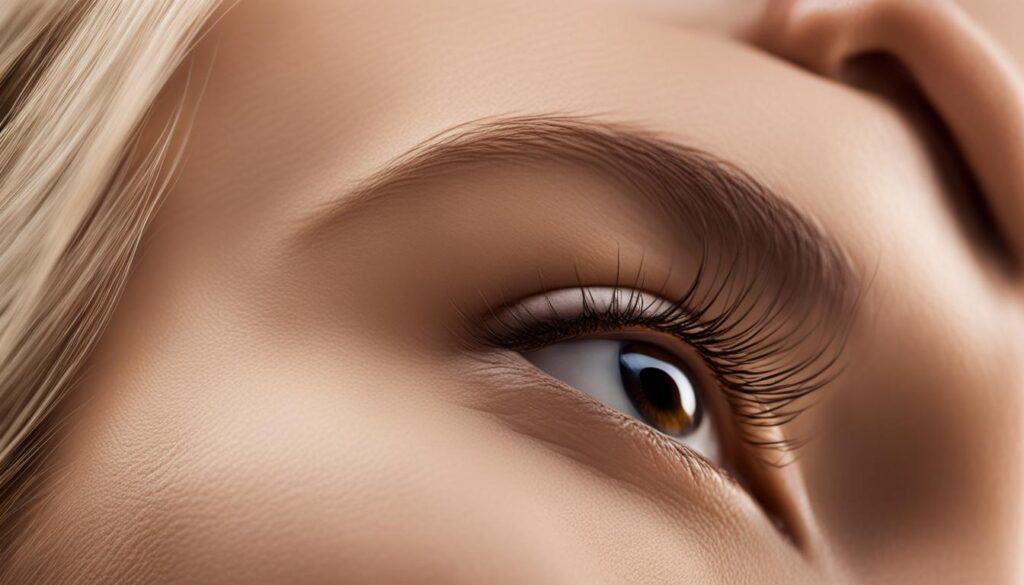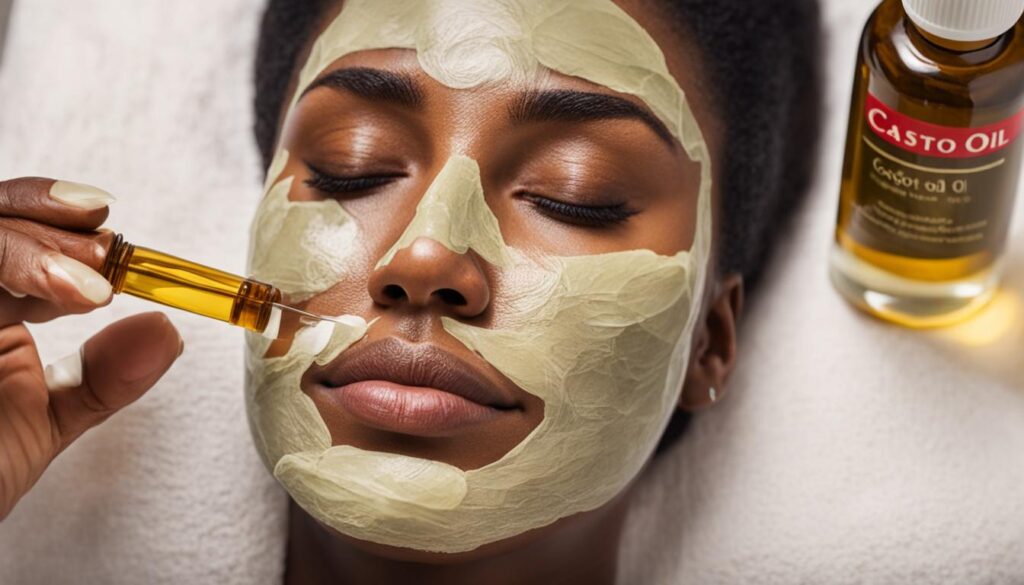Castor oil is a versatile vegetable oil that offers numerous benefits for the face and skin. It is known for its moisturizing, anti-inflammatory, and antimicrobial properties. Castor oil can help manage acne, improve skin texture and complexion, and soothe sensitive skin. It is also a cost-effective alternative to expensive skincare products.
However, while castor oil is generally safe for use on the face, it may cause skin irritation or allergic reactions in some individuals. It is important to dilute castor oil with a carrier oil before applying it to the face and to discontinue use if any adverse reactions occur. Further scientific research is needed to fully understand the dermatological benefits of castor oil.
Key Takeaways:
- Castor oil has moisturizing, anti-inflammatory, and antimicrobial properties that benefit the face and skin.
- It can help manage acne, improve skin texture, and soothe sensitive skin.
- Castor oil is a cost-effective alternative to expensive skincare products.
- It is important to dilute castor oil with a carrier oil and discontinue use if any adverse reactions occur.
- Further scientific research is needed to fully understand the dermatological benefits of castor oil.
How to Use Castor Oil on Your Face for Maximum Benefits
When it comes to achieving healthy and glowing skin, castor oil can be a powerful ally. By harnessing the moisturizing, antibacterial, and anti-inflammatory properties of castor oil, you can effectively improve the appearance and health of your skin. Here’s how you can use castor oil on your face to maximize its benefits.
Step 1: Dilute with a Carrier Oil
Before applying castor oil directly to your face, it’s important to dilute it with a carrier oil. Coconut oil, almond oil, and olive oil are popular choices that provide additional nourishment for the skin. To create the perfect blend, mix equal parts castor oil and carrier oil in a small container.
Step 2: Cleanse Your Face
Prior to applying the castor oil mixture, cleanse your face thoroughly using a gentle cleanser to remove any dirt, oil, or makeup. Pat your face dry with a clean towel.
Step 3: Apply the Mixture
Using clean fingertips or a cotton pad, apply the diluted castor oil to your face. Start with a small amount and gently massage it into your skin using circular motions. Focus on areas of concern, such as acne-prone areas, wrinkles, or dark spots.
Did you know? Castor oil contains ricinoleic acid, a fatty acid that has been shown to possess anti-inflammatory and antimicrobial properties, making it beneficial for acne-prone skin.
Step 4: Allow Absorption
For maximum effectiveness, leave the castor oil mixture on your face overnight. This allows the skin to absorb the oil and reap the benefits while you sleep. If you prefer a shorter treatment, leave it on for at least 30 minutes before gently wiping it off with a warm cloth.
Step 5: Perform a Patch Test
Before using castor oil on your entire face, it is important to perform a patch test. Apply a small amount of the diluted mixture to a discreet area on your skin, such as behind the ear or on the inner arm, and wait 24 hours to check for any adverse reactions. If no irritation occurs, it is safe to use the castor oil mixture on your face.
Regularly incorporating castor oil into your skincare routine can yield noticeable results. Here are some of the benefits you can expect:
Remember, individual results may vary, and it is important to listen to your skin’s needs. If you experience any adverse reactions, such as redness, itching, or inflammation, discontinue use and consult with a dermatologist.
The Benefits of Castor Oil for Facial Skincare and Beyond
Castor oil offers a wide range of benefits for facial skincare and overall skin health. Its anti-inflammatory properties help reduce skin irritation and inflammation, making it an excellent choice for those with sensitive skin or inflammatory skin conditions. Furthermore, its antimicrobial properties enable it to combat acne-causing bacteria and prevent bacterial infections, promoting clearer and healthier skin.
One of the key benefits of castor oil is its exceptional moisturizing properties. It helps to lock in moisture and maintain the skin’s natural moisture barrier, keeping the skin hydrated and supple. For individuals with dry skin, castor oil can be particularly beneficial as it provides intense nourishment and helps alleviate dryness and flakiness.
Moreover, castor oil has hydrating properties that enable it to draw moisture from the air into the skin, further enhancing its hydration levels. This helps to combat dryness and maintain a healthy complexion with a radiant glow.
Not only does castor oil moisturize and hydrate the skin, but it also acts as a potent cleansing agent. The triglycerides present in castor oil effectively dissolve dirt, makeup, and impurities, leaving the skin cleansed and refreshed. This makes it an ideal choice for individuals looking for a natural and gentle cleansing method.
Overall, the benefits of castor oil extend beyond just facial skincare. Its versatile properties make it a valuable ingredient in various skincare products, offering benefits for the entire body. Whether used for its anti-inflammatory, antimicrobial, moisturizing, hydrating, or cleansing properties, castor oil is a natural and effective solution for maintaining healthy, glowing skin.
Conclusion
Castor oil has become a popular choice in the skincare industry for its extensive benefits for the face and skin. Whether you’re looking to manage acne, achieve a radiant complexion, or provide deep moisturization, castor oil offers a natural and affordable solution for your skincare needs. However, it is important to note that scientific research on the dermatological advantages of castor oil is limited, and individual outcomes may vary. Therefore, it is advisable to consult with a healthcare professional or dermatologist before incorporating castor oil into your skincare routine, particularly if you have any pre-existing skin conditions. With proper dilution and careful use, castor oil can be a valuable addition to your skincare regimen.
FAQ
Why should I use castor oil for my face?
Castor oil offers numerous benefits for the face and skin, including moisturizing, anti-inflammatory, and antimicrobial properties. It can help manage acne, improve skin texture and complexion, and soothe sensitive skin.
How do I apply castor oil on my face?
To use castor oil on your face, it is recommended to dilute it with a carrier oil such as coconut oil, almond oil, or olive oil. Apply the mixture to a clean face before bedtime and leave it on overnight or for a few minutes before gently wiping it off with a warm cloth.
What are the benefits of using castor oil on the face?
Regular use of castor oil on the face can promote glowing skin, reduce acne breakouts, minimize the appearance of wrinkles, fade dark spots, and provide ample moisturization. It can also help manage acne, improve skin texture, and soothe sensitive skin.
Can castor oil be used for other skin conditions?
Yes, castor oil’s anti-inflammatory, antimicrobial, and moisturizing properties make it effective for various skin conditions beyond just the face. It can help reduce skin irritation, fight acne-causing bacteria, prevent bacterial infections, and cleanse the skin.


